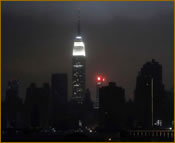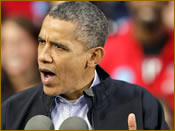The Desperate Hours
 Climate change is no longer a theory. I grew up in a New York suburb which is prim, proper and thoroughly bourgeois: it’s a place that features tidy suburban houses, neatly trimmed lawns and American flags fluttering proudly. While the weather could be wild, I don’t recall it being extreme. I remember one particular rainstorm; I was thirteen years old. I was walking home from school when it began. It was spring, so the torrent let loose the scents of fresh earth and new grass. Trees swayed in the wind, their leaves rustled. The raindrops were huge and soaked me to the skin: my footsteps turned into a run the moment the lightning flashed and the thunder sounded. I ran to my front door, I fumbled with my keys for a few moments before I was able to get in. Fortunately, no one else was home to see me in such a state; I remember how the thunder resounded after I shut the door. It was as if the storm was gloating; it was a powerful reminder that human beings are trivial creatures, and should Mother Nature choose, she could easily flick us off her back.
Climate change is no longer a theory. I grew up in a New York suburb which is prim, proper and thoroughly bourgeois: it’s a place that features tidy suburban houses, neatly trimmed lawns and American flags fluttering proudly. While the weather could be wild, I don’t recall it being extreme. I remember one particular rainstorm; I was thirteen years old. I was walking home from school when it began. It was spring, so the torrent let loose the scents of fresh earth and new grass. Trees swayed in the wind, their leaves rustled. The raindrops were huge and soaked me to the skin: my footsteps turned into a run the moment the lightning flashed and the thunder sounded. I ran to my front door, I fumbled with my keys for a few moments before I was able to get in. Fortunately, no one else was home to see me in such a state; I remember how the thunder resounded after I shut the door. It was as if the storm was gloating; it was a powerful reminder that human beings are trivial creatures, and should Mother Nature choose, she could easily flick us off her back.
Nevertheless, that rainstorm, though memorable, was minor; I only experienced one major storm during my childhood, Hurricane Gloria in 1985. My family and I sat in the cellar as we waited for it to pass: the power went out for a few hours, but then life went on more or less as usual.
Superstorm Sandy was an altogether different affair. I experienced it from a helpless distance from my parents who still reside in my former home town. I was horrified by the pictures taken from outer space of Sandy’s swirling, angry storm clouds and distressed by the earth-bound images of violent winds ripping the north east of America apart. Later, my heart sank when I saw shots of the darkened New York skyline: deprived of power, it seemed dead rather than a city that never sleeps.
In the aftermath, the BBC’s reporters visited sights which are very familiar to me, for example, the entrance to the Midtown Tunnel. I know it as the main artery by which I’d travel into Manhattan: there have been many mornings and evenings in which I sat in the back of my parents’ car, going to museums, concerts, or just for a walk amidst the city’s concrete canyons. That vital transport link was flooded out; the BBC correspondent stood by what looked like a lake, a flashing neon sign behind her was the only indication of its true function.
My parents were without power for six days. They had prepared for the storm: apparently the advice was to fill plastic bags with water, stick them in the freezer, and thus have additional ice packs with which to keep the contents cold. They had lanterns and candles. After Sandy hit, they were able to reach me only sporadically with text messages from their mobile phones. In turn, I used the internet to find out what was going on with repairs to the electricity grid and found local petrol stations which still had fuel. They told me that the local Starbucks became the place where people congregated for hot coffee, electricity and internet connections. The owners provided power extension leads so they could share sockets more easily; it was a small reaffirmation that the idea of community is not dead, it’s just ordering a skinny latte.
The internet was not altogether helpful wherever it was accessed: my parents’ local power company hadn’t adequately prepared and some of the most vital parts of their website frequently crashed. Nor were the cellphone companies fully ready: the signal dropped out on my parents’ handset several times and they were forced to go on a somewhat dangerous drive in order to pick it back up. Their electricity did not return until Saturday night: the telephone, internet and cable television systems were restored the following day. Not that the television news proved to be particularly comforting: Staten Island is apparently still in a dire state, the town of Far Rockaway, not far from my parents’ location, was subject to looting due in part to the extended power failure. Furthermore, my parents’ local and learned meteorologist said New Yorkers should expect two more storms of this magnitude by 2015.
No, it was never this bad when I was a boy: nature has become less forgiving, the parameters of what’s possible have expanded to the detriment of those who live in my home town. My parents are thinking of purchasing a backup generator to ensure their comfort and safety. They also bought flood insurance; some of my parents’ friends have already been flooded out. But none of them will attribute the increase in intemperate weather to climate change, not yet; rather, they harken back to storms they experienced as children and are adapting to these changes without assigning them any greater profundity. For the moment, however, they’re managing.
We have now moved on to another set of desperate hours: as I type this, the President and Mitt Romney are embarking on their final tours of swing states, stepping up to podiums in Iowa, New Hampshire, Colorado, Virginia and most crucial of all, Ohio. Ohio perhaps is a microcosm of the country as a whole: in its north, there are rustbelt industries which are struggling to adapt. The state also has old coal mines and new car plants. There are high tech companies as well; several years ago, I applied for a role with one such firm in Colombus which was and is a world leader. The culture and manners of the South make themselves felt in places like Cincinnati. Given this diversity, it is perhaps right and proper that Ohio is the state which decides: it is the true middle, the pivot of the nation as well as the election.
 The candidates have to put on their polished shoes, their shirts which thankfully they can now leave open at the neck, their windbreakers which hide sagging shoulders. I suspect they have to pop more than a few throat lozenges in their mouths before daring to speak. Sleep has probably long been submerged in seas of bad coffee or in Mitt Romney’s case, tap water and orange juice. Were I either of them, I’d look at the clock’s advances along time’s path with relief. In the case of President Obama, this is the last election he is likely to fight: while it’s true that he could run for another elected office again regardless of the outcome, the last former occupant of the White House to do so was John Quincy Adams. As for Mitt Romney, this is possibly his last shot at the Presidency; Paddy Power has already paid out the punters in anticipation of his defeat. Election night, win or lose, will bring deliverance from heated rhetoric and anticipation. The wider world can then settle into recovery mode in time for Christmas.
The candidates have to put on their polished shoes, their shirts which thankfully they can now leave open at the neck, their windbreakers which hide sagging shoulders. I suspect they have to pop more than a few throat lozenges in their mouths before daring to speak. Sleep has probably long been submerged in seas of bad coffee or in Mitt Romney’s case, tap water and orange juice. Were I either of them, I’d look at the clock’s advances along time’s path with relief. In the case of President Obama, this is the last election he is likely to fight: while it’s true that he could run for another elected office again regardless of the outcome, the last former occupant of the White House to do so was John Quincy Adams. As for Mitt Romney, this is possibly his last shot at the Presidency; Paddy Power has already paid out the punters in anticipation of his defeat. Election night, win or lose, will bring deliverance from heated rhetoric and anticipation. The wider world can then settle into recovery mode in time for Christmas.
The decision as to who will take up the challenges of 2013 and beyond perhaps lay with a reactive public; rather than adapt to climate change, they would rather clean up the mess afterwards, buy insurance, get a backup generator. Romney is vague on specifics: he will somehow cut taxes, increase defence spending and yet solve the deficit. The Governor has recently relied on a cliched slogan: “Real Change from Day One”, which sounds like a motto better suited to a probiotic yoghurt. The only reason such a platitudinous and intellectually vacuous campaign is at all viable is because it can serve as a reaction to a political and economic storm, namely, the lingering effects of the Great Recession. Similarly, President Obama has found it difficult to return to the themes of Hope and Change given the practical realities which surround him. If something hurts, what do you do to switch off the pain? A reactive person will reach for whatever they can find, even if it is rather like using whiskey to cure a hangover. A thoughtful person will realise that not every remedy that promises immediate relief is worth downing. What response prevails? The polls are finely balanced: almost any outcome can be read into them. Any prediction relies on excessive use of the word “if” – if Ohio tilts the President’s way, the contest is more than likely over. If Ohio plumps for Romney, he could yet scrape his way to victory.
It has reached a point where news programmes blend into each other and newspapers seem to say all the same thing: “if, if, if”. They prognosticate about a tomorrow that is altogether uncertain: perhaps this is why the world’s breath seems to be collectively catching, interspersed with it reassuring itself that surely sense will prevail and Obama will be re-elected. I wish I could be so sure.
President Obama is treading the long and lonely path leading to church meetings, town halls and high school stadiums. Perhaps he has a moment to face the rain and let it soak his face, a brief refreshment before he takes more weary steps towards the next group of voters whom he must touch both with the shaking of hands and the proffering of sensible ideas couched in soaring rhetoric. As he finishes each encounter, no doubt he feels his strength diminished. It’s not long now before the end will come and we can all return to normal, albeit its definition will remain permanently altered. Nevertheless, these are desperate hours and they will be desperate to the last.


